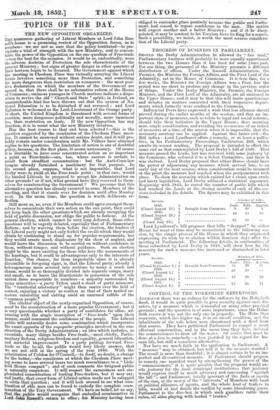PROGRESS OF BUSINESS IN PARLIAMENT.
SHOULD the Derby Administration be allowed its " fair trial," Parliamentary business will probably be more equally apportioned between the two Houses than it has been for some years past. For one thing, the personnel of the Ministry presents a different distribution of offices. Under the Russell Administration, the Premier, the Minister for Foreign Affairs, and the First Lord of the Admiralty, sat in the House of Commons. It is true that, for a few weeks, the Minister for Foreign Affairs was a Peer, but the period was too short to produce any change in the previous order of things. Under the Derby Ministry, the Premier, the Foreign Minister, and the First Lord of the Admiralty, are all stationed in the Upper House ; and-it may be that this will inoite questionings and debates on matters connected with their respective depart- ments which formerly were confined to the Commons.
Influential Peers have expressed a wish that less idleness should prevail during the earlier months of the session, and that an im- portant class of measures, such as relate to legal and social reforms, should take their initiative in the Upper House ; thus securing more ample consideration, and avoiding the recurrence of an influx of measures at a time of the session when it is impossible that the necessary scrutiny can be applied. Against this latter evil—the Bill influx—Lord Lyndhurst offers a remedy, or at least a pallia- tive, in his Parliamentary Proceedings Facilitation Bill, which awaits its second reading. The proposal is intended to effect the same end as that contemplated by Lord Derby's bill of 1848. That measure passed- the Lords, but was received with some jealousy by the Commons, who referred it to a Select Committee, and there it was shelved. Lord Derby proposed that either House should have the power of adjourning any measure which arrived late, to an early day of the next session, when consideration could be resumed at the point the measure had reached when the postponement took place. To show the necessity which existed for a cheek upon crude and hasty legislation, Lord Derby adduced a statistical argument. Beginning with 1845, he stated the number of public bills which had reached the Lords at the closing months of each of the ses- sions included in his details. The figures may be exhibited in this form.
Session. Number of Bills.
1845. June. July. August. (Closed August 19.)
1846. Brought from Commons. 9 59 1
10 15 36 (Closed August 28.) 1 (Closed July 23.) I
Lord Lyndhurst's bill proposes that bills "dropped" in either House for want of time may be resuscitated in the following ses- sion, by the simple process of the House in which they originated expressing its wish by re.olution within fourteen days after the meeting of Parliament. The following details, in continuation of those submitted by Lord Derby in 1848, will show how far the necessity for such a measure has increased or diminished in later years.
Session.
1848. June. July. August.
(Closed September 5.) Brought from Commons. 11 20 61 1849.
(Closed August L) 1850. (Closed August 15.) } 1851. (Closed August 8.) } 28 29 —
Number of Bins.
20 59 13 29 28 12 51 11


























 Previous page
Previous page